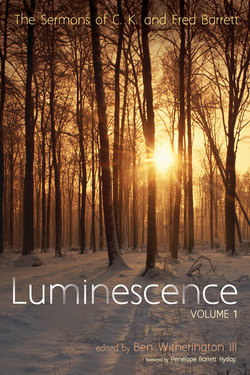Читать книгу Luminescence, Volume 1 - C. K. Barrett - Страница 14
На сайте Литреса книга снята с продажи.
“BLESSED ARE THEY THAT MOURN”—Matthew 5.4 (A Funeral Sermon)
Оглавление[Preached at Langley Park 3/2/87]
Lloyd Johnson was a man of many parts and rich gifts. He lived a long and full life, and to tell the story of it, even if I were competent to do that, would take far more time than we have in this service. It would not only take up too much time, it would take us where we don’t want to go for the purpose of this service, and certainly for this address, the purpose is not to praise a man however deserving of our praise, but to give thanks for his life and to set forth in this special setting, the Gospel of Jesus Christ by which he lived, and which he would commend to us now in his death as he did in his life.
Others will have known him in other contexts, but when I think of Lloyd, I think pre-eminently of two themes, two characteristic occupations. One of them is music. Many of you here will well know that for more than four decades I have loved to go about the village chapels of this county; on Sundays they have been my world and I would not change it for another. But to be honest, one does not visit the chapels for their music. For good, hearty singing—yes; but not for music. With one exception—Langley Park. Here indeed there was hearty singing, but there was also the finest of pure music, J. S. Bach and all his organist successors, up to the present day. And this great music was played with the most sensitive artistry and taste.
The other theme is preaching. It is not merely that Lloyd had heard and read the great preachers and loved to talk about them and tell stories of their lives. He was a practitioner too. To hear Bach well played is not an every day, or an every Sunday, experience. To hear a sermon conveyed in a pure, simple, powerful English style, enriched with an incredible width of reading, and at the same time full of the Gospel that the rest was remarked only in recollection—this too was not an every Sunday experience.
Music and preaching; for years on the Langley Park organ, for years as local preacher secretary in the Durham circuit, with the editing of Contact, the best circuit preacher’s magazine I have seen anywhere; already on Thursday afternoon I was turning over the question how we could put these two things together in the few moments of this service. I thought of Bach’s great Mass, which some of us will hear next week in Durham Cathedral. That would do, beginning as it does with the great Kyrie Eleison, “Lord have mercy.” As Edwyn Hoskins said, there is only one fitting inscription for a Christian to put on his tombstone; not John Smith, Prime Minister of England, but only “Jesu mercy.” Lloyd would have understood that.
But Brahms has done it better for today, when he begins his Requiem with the words of Jesus in the Beatitudes—“Blessed are they that mourn, for they shall be comforted.” And that is where we ought to begin, for if there is anyone here to whom the Gospel is to be preached it is you, who cared for him with so much love and care, Eva and Marian, and you who stand beside them. And this is the word of Christ to you—“Blessed are they who mourn.” God always begins where we are; not where we ought to be, but where we are. He knows what we need, what at any time we need most, and he never turns away from that necessity. There is a blessedness in mourning, not in itself, but in what God does about it; “they shall be comforted.”
Brahms is a good preacher. He doesn’t let us run away from the facts. “All flesh is grass, and all the good blooms of it as the flower of the grass; the grass withereth, the flower fadeth.” All this is true and well we know it today. But—how the music brings out that tremendous but! “But the Word of the Lord standeth for evermore.” Today, you need no one to lecture you on the fragility of human life; perhaps you do need to be reminded of the Word of God, which endures forever—the word of goodness and love and life, which Jesus spoke, which Jesus is.
“Blessed are they that mourn”—the musical theme returns at the end, with new words, “Blessed are the dead that die in the Lord.” The subtle musical continuity brings out the continuity of meaning. There is blessedness for the mourners only because there is blessedness for the dead, not because they are dead, but because they are in the Lord. As they have been, so they are.
That is the last word. We can only paint pictures and the best pictures are inadequate. But we know that Lloyd that good man, so richly endowed with God’s gifts not only of mind and ear but of heart, and home, and family and friends, is now with all the saints, for whom music and the proclamation of the Gospel are one as they write in the hymn of praise, “Worthy is the Lamb that was slain, to receive power and riches and wisdom and might and honor and glory and blessing.” And the saints on earth will learn in their comfort to join the hymn.
